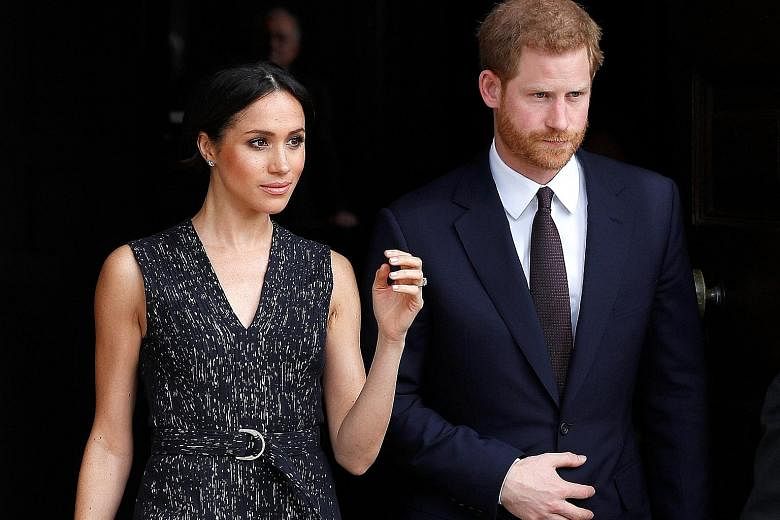LONDON • Mr Arthur Edwards, a photographer for The Sun, has spent four decades tagging along after members of Britain's royal family.
He sprinkles his conversations with recollections of kindness bestowed on him over the years: a jocular telegram from Prince Charles in 1981, a thoughtful telephone call to his granddaughter from Princess Eugenie in 2013.
But raise the subject of Prince Harry, whose May 19 wedding to American actress Meghan Markle will be the highlight of the year for much of the British media, and his face clouds over.
"He's become - it's no secret - he's become very withdrawn. He doesn't say 'good morning' to us anymore," he said. "He's upset with us generally."
If Mr Edwards had hopes that Prince Harry would be in a forgiving mood as the wedding approached, they were banished when Kensington Palace announced details of the media's access to the ceremony: Specifically, there will be almost none.
One reporter will be allowed into St George's Chapel for the wedding, a palace spokesman said on Tuesday, noting that the space is small and it is not a formal state occasion.
Four photojournalists will get coveted spots outside the chapel. Scores more will be stationed along the carriage route and on the castle grounds.
The 77-year-old, a veteran of seven royal weddings, said he assumed the decision was Prince Harry's. "I can't imagine the press officer advising that to the prince," he said. "He and Meghan have seen what's been written and said, 'We don't want anyone near the wedding.' That's a clear message."
Markle - a divorced, biracial American television actress - is a strikingly untraditional wife by royal standards.
The British tabloids have not treated her with kid gloves, featuring a drumbeat of unflattering interviews with relatives she has not invited to the wedding.
But the relationship between the royal family and the tabloids, two pillars of conservative England, was fraught with tension long before she arrived on the scene.
For decades, when not effervescing over royal weddings and births, the tabloids have castigated the royals as lazy, frumpy, dissipated or self-indulgent. The royals have used all the means at their disposal to curtail access to their personal lives.
Each side is also aware of its dependence on the other - the newspapers for access and the royal family for publicity.
Mr Stig Abell, who served as director of Britain's Press Complaints Commission, a regulatory body, described the relationship as "a hug that was always threatening to become an assault".
Prince Harry's wedding seems to mark a turning point, as a younger generation with a bone-deep mistrust of the news media takes centre stage.
Prince Harry and his brother, Prince William, were 12 and 15 when their mother, Princess Diana, was killed in a car crash, as her driver careened through a Paris tunnel trying to escape paparazzi on motorcycles.
Prince Harry, in particular, has made no secret of his loathing for those photographers, who he said in an interview last year, "instead of helping, were taking photographs of her dying on the backseat".
Try to interview editors and palace veterans about the tug of war over access, and the tension quickly becomes evident. For one thing, virtually no one is willing to go on the record.
"They actually hate the British press. That's probably a fair summary," a senior journalist said of the princes.
A former palace aide said tabloid editors sometimes pursued negative storylines as revenge for reduced access, and sometimes as a way to keep the coverage interesting.
"It's like a graph of a share price: up and down, and up and down. What the media doesn't like is a plateau," he said. "The Meghan share price is clearly on an upward trend. But it will peak. And there will be a sell-off."
Already, acid-tongued criticism of Markle can be found in The Daily Mail. The tabloid's vast readership skews female and older, with nearly half its readers over age 65 - meaning it reaches the heart of the monarchy's most fervent, and most conservative, support.
A single edition of the newspaper, on a recent Saturday, featured a pullout magazine section headlined "Why did Meghan's marriage implode?" which scrutinised, in skin-crawling personal detail, Markle's break-up with her first husband; a mocking report on her father's efforts to lose weight ahead of the wedding; a column interviewing her estranged half-brother and half-sister, who complained they were not invited to the wedding; and a sneering two-page synopsis of her acting career.
The Mail on Sunday, published the next day, featured a front-page interview with Markle's uncle, who was also disgruntled about not being invited.
This sort of treatment is an old tradition. When Ms Kate Middleton was dating Prince William, a "royal insider", quoted in The Mirror, described her as "incredibly middle-class. She uses words such as 'pleased to meet you,' 'toilet' and 'pardon'".
Prince Harry, clearly anxious about how this would affect Markle, made an unusual gesture late in 2016. Their relationship had just become public, inspiring headlines such as "Harry's girl is (almost) Straight Outta Compton" (The Daily Mail).
Departing from palace tradition, he released an angry letter detailing "a wave of abuse and harassment" by members of the press.
Mr Abell, who served briefly as managing editor of The Sun, said the palace had identified, correctly, that the leverage of the print press was waning. "All the power now resides in the royals, in the way it does in a lot of celebrities," he said.
NYTIMES

